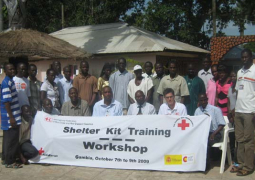
The Gambia National Commission for UNESCO in collaboration with the UNESCO Regional Office in Dakar Monday started a three-week capacity building training programme for nine community Radio Broadcasters in the country.
The
training, according to officials is expected to build the skills and capacities
of community radio presenters across the country on news gathering, packaging,
interview techniques, and live coverage, editing and production as well as
financial record keeping, marketing and basic skills in radio maintenance.
In
her speech at the opening of the training at the Gambia Press Union office, the
Liaison officer for Banjul, Hadjan Dovcoure, disclosed that The Gambia
community radios are facilitating the freedom of expression and access to
information by providing crucial support to the ongoing democratic process.
The
potential of community radios to reach the Gambian people, even those with
little or no access to information, allows them to educate and inform about crucial
issues.
She
divulged that the contribution of community radios to the democratic process is
undeniable, adding that they have the ability to allow communities whose access
to information and means of self-expression are limited, to voice their concerns
and make their views known on decisions that concern them.
For
his part, the deputy permanent secretary at the Ministry of Information, Malick
Jones, informed the gathering that since 2004, well-meaning Gambians have been
advocating for capacity building training for journalists so that journalists will be able to
contribute effectively to the democratization process.
“We
believe the media can contribute immensely if the journalists are well trained.
In 1965 there was only one community radio station,” he said.
Community radio plays a crucial role when it
comes to the dissemination of information in their various communities but they
struggle with equipment and electricity problems, as such they need support,
especially from the donor countries.
The
director of Community Development, Buba Joof, lauded the training, stressing
that it could not have come at a better time, especially when one looks at the
capacity gaps that exist in some community radio stations and the role
community radios play in nation building.
“Community
radio stations are enabling isolated communities to voice their own concerns.
Ordinary citizens have the opportunity to discuss issues that is central to
them on air, such as gender relations, group organisation and management, popular
participation, health and education, combating HIV/AIDS amongst others,” he
said.
He
regretted the fact that despite the increase in new information outlets, there
are still millions of people in Africa including The Gambia that remain
voiceless.
“Most media in many parts of the world still
remain largely state controlled. But the tide of democracy sweeping the
continent has seen governments loosening their grip on the airwaves, paving way
for a more inclusive participation in the media through mass communication
tools.”
Speaking
on behalf of the radio broadcasters, Modou Touray, thanked the organizers for
their noble gesture, noting the training would enhance the skills of the
community radio presenters to a large extent and would help presenters to play
key role in the new democracy.


